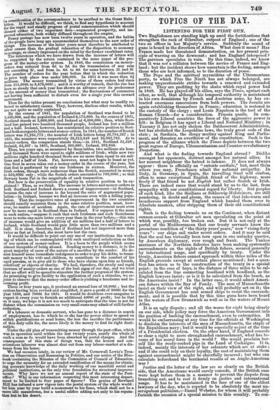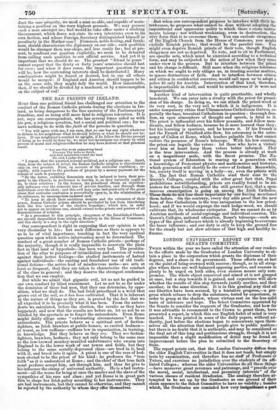TOPICS OF THE DAY.
LISTENING FOR THE FIRST GUN.
Two Englishmen are standing high up amid the fortifications that strengthen the rock of Gibraltar, outpost of England ; one of the two an officer in her Majesty's service. Suddenly the sound of guns is heard in the direction of Africa. What does it mean P Has France made her threatened demonstration, on her present prin- ciple of warring on the downcast ; and has England interposed ? The garrison speculates in vain. By this time, indeed, we know that it was not a collision between the navies of France and Eng- land ; but the incident shows how uncertain is the feeling, amongst those who are best informed, as to the duration of peace. The Pope and the spiritual myrmiddns 41 the Ultramontane party to which Pins the Ninth has not always belonged, are making unquestionable strides towards a renewed and extended power. They are profiting by the shake which royal power had in 1848. He has played off his allies, says the Times, against each other, so well, that although his temporal authority is maintained in his own dominions by French and Austrian arms, he has ex- tracted enormous concessions from both powers. The Jesuits aro again establishing themselves in France ; education is restored to the custody of the clergy ; and Louis Napoleon is the tool of the Roman Church—for a consideration. Prussia quails. In com- paratively Liberal countries the force of the aggressive power is felt : in Belgium it has upset a Liberal and National Ministry ; in Tuscany it has not only shaken the Baldasseroni Administration, but has abolished the Leopoldine laws, the truly great code of the state ; in Sardinia, the clergy mutiny against King and Parlia- ment, and threaten an overthrow of the constitution. Such is the progress of the alliance which the Times depicts between the two great rogues of Europe, Ultramontanism and Counter-revolutionary Despotism.
And what is the feeling towards England abroad ? Dislike amongst her opponents, distrust amongst her natural allies. In her nearest neighbour the hatred is intense. It does not always appear : there is officially an " entente cordiale," but, meet them where you may, Frenchmen admit the national antipathy. In Italy, in Germany, in Spain, the travelling Gaul will confess, often to some exceptional English friend of the highway, more freely if that friend be not English but rather Scotch or Irish. There are indeed races that would stand by us to the last, from sympathy with our constitutional regard for liberty. But peoples of such kind, like the Sicilians or Schleswig-Holsteiners, are still pondering, in doubt and gloom, the causes of that lukewarm and treacherous support from England which handed them over to Absolute masters, after stripping them of their old constitutional rights.
Such is the feeling towards na on the Continent, when distant cannon-sounds at Gibraltar set men speculating on the point at which war, possibly, has broken out. But it is not only at the portal of the Mediterranean that our trusty servants know the precarious condition of " the thirty years' peace," now " rising forty years" : our ships sail under secret orders. And it may be said that the seal has virtually been torn open in one unlucky quarter, by American diplomacy, ever rough and frank. The Yankee mariners of the Northern fisheries have been making systematic encroachments on the rights of British fishers, secured generally by international usage, and specifically by treaty. Under the treaty, American fishers cannot approach within three miles of the English grounds except at certain places mentioned ; but a ques- tion has arisen as to the construction of the treaty in a special point : in the case of bays, is the distance of three miles to be cal- culated from the line connecting headland with headland, as the English lawyers insist; or is it to be calculated from the beach, as the Americans insist ? In the latter case, it would admit Ameri- can fishers within the Bay of Fundy. The men of Massachusetts insist on their view of the right, and will probably act on it; the English Government has sent armed ships to resist the encroach- ment; and it is possible that by this time guns have been heard in the waters of New Brunswick as well as in the waters of Mount Atlas.
It is an ugly dispute ; and all the worse for right being clearly on our side, while policy may fo'ne the American Government into the position of backing the encroachment, even to extremities. It would be embarrassing at any time for the officials at Washington to disclaim the interests of the men of Massachusetts, the staple of the Republican navy; but it would be especially so just at the time of a Presidential election. On the other hand, if England concede so clear a right to mere snonghanded encroachment, what has be- come of her moral force in the world P She would proclaim her-
self like the ready-cooked pigs in the Land of Cockaigne. It is, indeed, mainly the interests of her colonists which are at stake ; and if she could rely on their loyalty, the cost of maintaining them against encroachment might be cheerfully incurred ; but who can calculate beforehand the territorial results of an Angld-American war ?
Justice and the letter of the law are so clearly on the British
side, that the Americans would surely concede, if the British case were kept before them in a manner to .prevent the dispute from branching out, and to rest it firmly on justice and international usage. It has to be maintained in the face of one of the ablest lawyers of the day, who is reputed to be absolutely the most un- scrupulous politician,—Daniel Webster, for whom it will probably furnish the occasion of a special mission to this country. To con- duct the ease properly, we need a man as able, and capable of main- taining a position on the very highest grounds. We may possess such a man amongst us ; but would he take office under a slinking Government, which dares not state its own intentions even to its own faction, and whose Foreign Secretary distinguished himself so peculiarly in the Mather ease ? Firmness, noble feeling, and frank- ness, should characterize the diplomacy on our side ; such qualities would be stronger than war-ships, and less costly far ; but at pre- sent, to confront our position explicitly, we seem to be debarred from calling such qualities to our official service. And yet it is important that we should do so. The greatest "friend to peace " cannot expect that the thirty or forty years' armistice should last for ever; and when it does cease, the important question for us
w ill be, how the contending interests shall be distributed a Many combinations might be feared or desired, but in one all others would be merged: if England and America should happen to be on the same side, they might defy the world. How lamentable, then, if we should be divided by a mackerel, or by a misconception on the subject of cod!



























 Previous page
Previous page